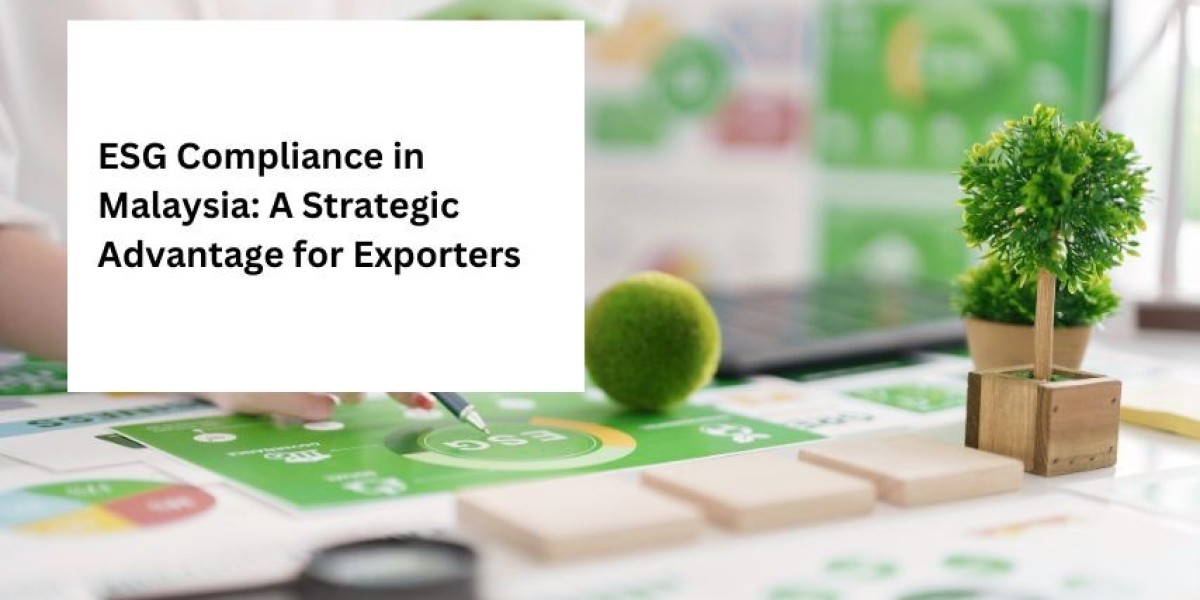The global business landscape is changing. Beyond profits and losses, a company's impact on the environment, its treatment of people, and its governance practices are now under intense scrutiny. This is the core of Environmental, Social, and Governance (ESG) criteria. For Malaysia's export-oriented companies, embracing ESG compliance is no longer just a trend; it is a critical strategic advantage that unlocks new markets, strengthens brand reputation, and drives long-term growth. This article explores how Malaysian exporters can turn ESG compliance into a powerful competitive edge.
What is ESG and Why Does It Matter Globally?
ESG represents the three central pillars used to measure the sustainability and ethical impact of an investment in a business or company.
- Environmental (E): This pillar examines how a company performs as a steward of nature. It covers areas like energy use, waste management, pollution, natural resource conservation, and climate change policies.
- Social (S): This pillar focuses on how a company manages relationships with its employees, suppliers, customers, and the communities where it operates. Key issues include labor standards, health and safety, diversity and inclusion, and data protection.
- Governance (G): This pillar deals with a company’s leadership, executive pay, audits, internal controls, and shareholder rights. It addresses issues like bribery and corruption, board composition, and transparency in corporate reporting.
Globally, the push for ESG compliance is accelerating. Consumers are increasingly choosing brands that align with their values. Investors are using ESG criteria to identify companies with superior long-term prospects and lower risk profiles. Governments and international bodies are introducing stricter regulations, such as the European Union's Carbon Border Adjustment Mechanism (CBAM), which places a tariff on carbon-intensive goods. For companies that are part of a global supply chain, strong ESG performance is becoming a non-negotiable requirement from major multinational corporations.
Malaysia's ESG Landscape: Regulations and Initiatives
Malaysia is actively strengthening its ESG framework to align with global standards and enhance its economic competitiveness. The government and regulatory bodies have introduced several key initiatives to drive sustainability in Malaysia.
The National ESG Industry Framework (i-ESG)
Launched in 2023, the i-ESG framework provides a structured pathway for manufacturing companies, including small and medium-sized enterprises (SMEs), to adopt ESG principles. Spanning from 2024 to 2030, the framework outlines four main pillars: standards, financing, capacity building, and market mechanisms. It aims to help businesses, particularly those in export markets, understand and implement sustainable practices to meet international demands.
Bursa Malaysia's Enhanced ESG Reporting Requirements
Bursa Malaysia, the country's stock exchange, has been a regional leader in promoting corporate sustainability. It has mandated ESG reporting for all publicly listed companies, with requirements becoming progressively more stringent. The enhanced framework requires detailed disclosures on climate-related risks and opportunities, aligning with the recommendations of the Task Force on Climate-related Financial Disclosures (TCFD). This push for transparency forces companies to embed ESG considerations into their core business strategies.
Government Policies and Incentives
The Malaysian government supports the ESG agenda through various policies, including the National Energy Transition Roadmap (NETR) and the New Industrial Master Plan 2030 (NIMP 2030). These plans emphasize decarbonization, renewable energy adoption, and sustainable industrial development. Financial incentives, such as grants and tax breaks, are also available for companies investing in green technology and sustainable projects, encouraging a faster transition toward ESG compliance.
Strategic Benefits of ESG for Malaysian Exporters
For export-oriented companies, the benefits of robust ESG compliance extend far beyond ticking a regulatory box. They represent tangible strategic advantages that directly impact the bottom line and long-term viability.
1. Unlocking Access to Global Markets
Many developed markets, particularly in the European Union and North America, have stringent ESG-related import regulations. Companies that cannot demonstrate compliance with standards on forced labor, deforestation, or carbon emissions risk being shut out of these lucrative markets. Proactive ESG compliance ensures that Malaysian products meet these international requirements, securing and expanding market access. It acts as a passport to the global marketplace, allowing exporters to confidently engage with discerning international buyers.
2. Attracting Investors and Securing Favorable Financing
Modern investors view strong ESG performance as a proxy for good management and lower risk. Companies with high ESG ratings are often seen as more resilient, innovative, and better prepared for future challenges. This perception attracts both local and foreign direct investment. Furthermore, banks and financial institutions are increasingly offering green financing and sustainability-linked loans with more favorable terms to companies that meet specific ESG targets. For exporters needing capital to expand, a strong ESG profile can unlock better and cheaper financing options.
3. Enhancing Brand Reputation and Customer Loyalty
In a crowded global market, a strong commitment to sustainability can be a powerful brand differentiator. Consumers are more likely to support and remain loyal to brands they perceive as ethical and environmentally responsible. By transparently communicating their ESG efforts—from using sustainable raw materials to ensuring fair labor practices—Malaysian exporters can build trust and a positive brand image. This reputation can translate into a price premium and a more resilient customer base.
4. Improving Operational Efficiency and Reducing Costs
The principles of ESG often drive significant operational improvements. For example, focusing on the "Environmental" pillar can lead to reduced energy consumption, less waste, and more efficient use of raw materials, all of which lower operational costs. Implementing better "Social" practices, such as improved workplace safety and employee wellness programs, can lead to higher productivity, lower employee turnover, and reduced recruitment costs. Strong "Governance" ensures streamlined processes and minimizes the risk of costly fines or legal battles.
Challenges to ESG Adoption and How to Overcome Them
Despite the clear benefits, many Malaysian companies, especially SMEs, face significant hurdles in their ESG journey.
Common Challenges:
- High Initial Costs: Implementing ESG initiatives, such as upgrading to energy-efficient machinery or investing in new reporting systems, can require substantial upfront capital.
- Lack of Expertise: Many companies lack the in-house knowledge to navigate complex ESG frameworks, measure their impact, and compile comprehensive reports.
- Complex Supply Chains: For exporters, monitoring and ensuring ESG compliance across a multi-tiered supply chain can be incredibly difficult and resource-intensive.
- Data Collection and Reporting: Gathering accurate, reliable data across environmental, social, and governance metrics is a major operational challenge, especially for companies new to ESG.
Overcoming the Hurdles:
- Start Small and Prioritize: Companies don't need to tackle everything at once. Begin by conducting a materiality assessment to identify the ESG issues most relevant to your business and stakeholders. Focus on a few high-impact areas first, such as energy efficiency or workplace safety.
- Leverage Government Support: Take advantage of the grants, tax incentives, and capacity-building programs offered by government agencies like MITI and its related bodies. The i-ESG framework is designed specifically to guide companies through this process.
- Seek External Expertise: Consider engaging ESG consultants or advisors who can provide guidance on strategy, data collection, and reporting. This investment can save time and prevent costly mistakes.
- Embrace Technology: Utilize software and digital tools to automate data collection and analysis for ESG reporting. Technology can help streamline the process, improve accuracy, and provide valuable insights for decision-making.
- Collaborate with Supply Chain Partners: Work closely with suppliers to encourage and support their own ESG efforts. Building a sustainable supply chain is a collaborative process that benefits all parties involved.
Malaysian Companies Leading the Way in ESG
Several Malaysian companies have demonstrated that excellence in ESG is achievable and profitable. Their success stories serve as inspiration and a practical guide for others.
Sunway Group: A prominent conglomerate, Sunway has integrated the UN Sustainable Development Goals (SDGs) into its business strategy. The company is committed to carbon neutrality by 2050 and has invested heavily in renewable energy, water treatment solutions, and sustainable urban development. Its transparent and detailed sustainability reporting sets a high standard for corporate governance in Malaysia.
Petronas: As a national oil and gas company, Petronas faces significant ESG challenges. However, it has committed to achieving Net Zero Carbon Emissions by 2050. The company is actively investing in cleaner energy solutions, including renewables and hydrogen, and has implemented robust social programs focused on education and community development.
Top Glove Corporation: Despite facing intense scrutiny over labor practices, Top Glove has made significant strides in improving its social compliance. The company has invested heavily in remediating recruitment fees for its migrant workers, upgrading worker accommodations, and implementing a "zero harm and healthy workplace" policy. This demonstrates a commitment to addressing critical social issues head-on.
Conclusion
For Malaysia's export-oriented companies, the era of viewing ESG as optional is over. It has evolved from a corporate social responsibility initiative into a fundamental component of business strategy. Embracing ESG compliance is not a cost but an investment—an investment in resilience, market access, and long-term profitability.
Companies that proactively integrate ESG principles into their operations will be better positioned to navigate global regulations, attract investment, win over consumers, and operate more efficiently. Those that fail to adapt risk being left behind, facing shrinking markets and diminishing relevance. The path to full ESG compliance may present challenges, but with a strategic approach and support from national initiatives, Malaysian exporters can transform these challenges into a powerful and lasting competitive advantage on the world stage.








